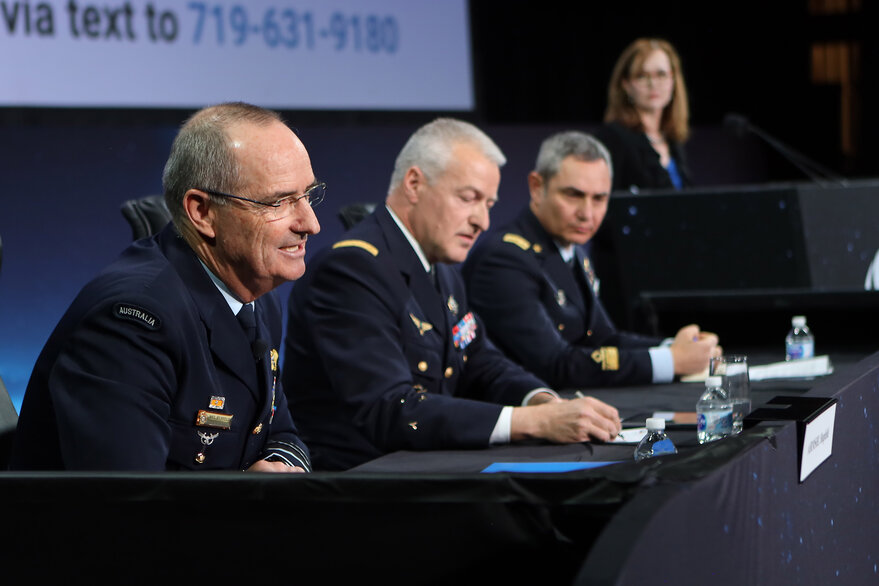COLORADO SPRINGS – The U.S. Space Force is working with allies to establish international norms of behavior for space activity and to share a common operating picture of activity occurring in space.
“What’s lacking at the moment is the ability to then apply consequences,” Air Marshal Mel Hupfeld, Royal Australian Air Force chief, said during an April 5 Space Symposium panel. “Once we can get an agreed position on behaviors and norms in space, then how do we define consequences for those that may not follow it?”
Many conversations at the 37th Space Symposium revolved around norms of behavior in light of the Russian antisatellite test in November, the ongoing Russian war in Ukraine and the international response.
Since Russia invaded Ukraine in February, the United States, European nations and allies have worked together to support Ukraine and to penalize Russia through economic sanctions.
“How do we apply those lessons to the space domain,” Hupfeld asked. “How do we apply consequences of not following the norms and behaviors that we all agree on in a way that applies counterspace capabilities that don’t create debris? These are things that I’m not so sure of yet, but they are things that we’re working towards.”
While those questions are being addressed, it’s important for countries to demonstrate responsible behavior in space through their own actions, said Gen. John “Jay” Raymond, U.S. Space Force chief of space operations. “We have to set the example,” he added.
Another imperative is “to call out those that aren’t playing by the rules,” Raymond said. “Over the course of the last couple years, partners have gotten together and have messaged inappropriate or unprofessional behavior in space. I think the collective voices add a lot of power to that.”
Finally, nations need to work together through the United Nations to establish binding agreements, panelists said.
The United Kingdom has taken the lead on working with the U.N. Committee on the Peaceful Uses of Outer Space to establish norms of responsible behavior for military space activities.
NATO is “fully supportive of that,” said Lt. Gen. David Julazadeh, deputy chief of staff for capability development at NATO’s Allied Command Transformation headquarters. “It’s incredibly important that we follow up with that.”
Brig. Gen. Luca Capasso, Italian Space Operations Command chief, added, “We need something that is binding in order to stigmatize the wrong activity in space. I think that working together probably we are going to be able to achieve the goal of adopting new norms.”
Equally important is obtaining a common operating picture, said Air Vice-Marshal Paul Godfrey, who leads the U.K. Space Command.
“When we’re all seeing the same thing and we’re seeing nefarious activity, then we can all call it nefarious activity,” Godfrey said.
While allied military leaders are eager to adopt norms for responsible behavior, “definitely we don’t want any legally binding treaty” like the Prevention of the Placement of Weapons in Outer Space and the Threat or Use of Force Against Outer Space Objects (PPWT) proposed by China and Russia, said Maj. Gen. Michel Friedling, French Space Command leader.
“As you all know, PPWT is sponsored by two nations, China and Russia, who want to ban weapons in space,” Friedling said. “At the same time, we all know they do exactly the contrary. And we all know that such a treaty would be unverifiable and incomplete because it doesn’t address anything from the ground to space.”
